The Christ Child: Burst of Light Out of the Darkest Midnight
Tuesday, December 11, 2007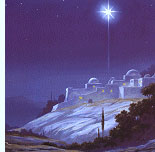 Conquering the deepest darkness
Conquering the deepest darknessThe Scripture says, "Get up, O sleeper, arise from out of the dead, and the Christ will shine on you" (Ephesians 5:14). The context is the wonderful transformation that takes place at baptism, when someone spiritually dead suddenly receives spiritual life, the sinner becomes the saint, and an awesome, profoundly powerful light penetrates and conquers the deepest darkness. But what now happens in scriptural baptism has happened before.
Mountaintops often come with cliffs
Sometimes, the greatest woes fall upon people immediately after the happiest time of
 their lives. Job thought the blessings of his life would go on and on. He had seven sons and three daughters, and he owned a thousand sheep for each son, and a thousand camels for each daughter, not counting the oxen and the donkeys. He was the greatest man in the East, but in a day he had lost it all.
their lives. Job thought the blessings of his life would go on and on. He had seven sons and three daughters, and he owned a thousand sheep for each son, and a thousand camels for each daughter, not counting the oxen and the donkeys. He was the greatest man in the East, but in a day he had lost it all.Just two weeks ago, the nephew of one of the Christians in our congregation was preparing for his wedding, set for December 15. Tony was 19 and his fiancée Kelcy was 21. Then, suddenly and without any warning, Kelcy died. That may be the risk of a mountaintop experience: many mountaintops come with cliffs. They buried Kelcy in her wedding dress.
At the peak of prosperity
During the reign of Jeroboam II, from 793 to 753 B.C.E., the northern nation of Israel was at the peak of its prosperity. This happened despite Jeroboam's
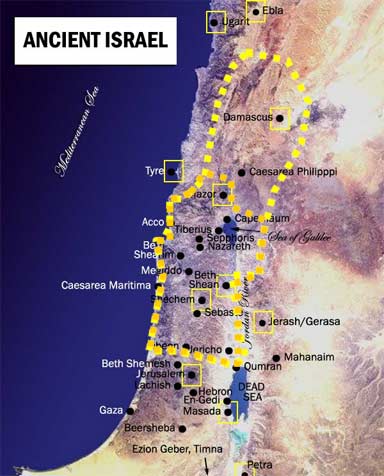 wickedness. The biblical text offers this explanation: "The LORD had seen how bitterly everyone in Israel, whether slave or free, was suffering; there was no one to help them. And since the LORD had not said He would blot out the name of Israel from under heaven, He saved them by the hand of Jeroboam son of Jehoash" (2 Kings 14:26-27). Jeroboam even conquered Damascus and "restored the boundaries of Israel from the entrance to Hamath" (way north of Damascus) "to the Sea of the Arabah" (known to us as the Dead Sea), "in accordance with the word of the LORD, the God of Israel, spoken through his servant Jonah son of Amittai, the prophet from Gath Hepher" (2 Kings 14:28, 25).
wickedness. The biblical text offers this explanation: "The LORD had seen how bitterly everyone in Israel, whether slave or free, was suffering; there was no one to help them. And since the LORD had not said He would blot out the name of Israel from under heaven, He saved them by the hand of Jeroboam son of Jehoash" (2 Kings 14:26-27). Jeroboam even conquered Damascus and "restored the boundaries of Israel from the entrance to Hamath" (way north of Damascus) "to the Sea of the Arabah" (known to us as the Dead Sea), "in accordance with the word of the LORD, the God of Israel, spoken through his servant Jonah son of Amittai, the prophet from Gath Hepher" (2 Kings 14:28, 25).This is the same Jonah who preached in Nineveh. You may not be familiar with his hometown, a tiny village in Galilee, as a matter of fact very near to what would later be Nazareth. The land was so prosperous that a few years later, King Menahem was able to buy off Tiglath-Pileser and stop his invasion by paying the Assyrian king a thousand talents of silver-that's 37 tons-an astounding sum that he was able to raise by extracting 50 shekels from every wealthy man in his realm. 50 shekels is 1-1/4 pounds, which means that the northern nation of Israel at that time had 59,200 wealthy men! Of course, this was a foolish thing to do, for it only convinced Tiglath-Pileser that he could extract more money from the prosperous kingdom.
Doomed self-indulgence
You can read descriptions of Israel's self-indulgent prosperity under Jeroboam in the prophet Amos: "You lie on beds inlaid with ivory and lounge on your couches. You dine on choice lambs and fattened calves. You strum away on your harps like David and improvise on musical instruments. You drink wine by the bowlful and use the finest lotions, but you do not grieve over the ruin of Joseph" (Amos 6:4-6).
Earlier the prophet describes the Israelite women as "cows of Bashan on Mount Samaria." (Bashan was the lushest pastureland in the nation, which grew the fattest livestock.) He addresses them as "you women who oppress the poor and crush the needy and say to your husbands, 'Bring us some drinks!'" (Amos 4:1). The prophet predicts their doom: "The Sovereign LORD has sworn by His holiness: 'The time will surely come when you will be taken away with fishhooks. You will each go straight out through the breaks in the wall" (Amos 4:2-3).
Great instability
Over the next 50 years, the nation that had basked in the
 sunlight of prosperity plunged into darkness. Politically, it was a time of great instability: of the six rulers that succeeded Jeroboam II, four of them were assassinated.
sunlight of prosperity plunged into darkness. Politically, it was a time of great instability: of the six rulers that succeeded Jeroboam II, four of them were assassinated.Spiritual bankruptcy
While all of this was going on in Israel, the southern kingdom of Judah had issues of its own. It too was experiencing physical prosperity but also spiritual bankruptcy. Idolatry, witchcraft, sexual immorality, and even child sacrifice were commonplace. Priests and prophets had their hands in the till and habitually got drunk on the job. God's true prophets were ignored, or ridiculed, or persecuted, imprisoned, and slain. The kings were often wicked, and even the righteous ones like Azariah were flawed.
Approaching war machine
All the while, approaching from the Northeast, was the largest, most formidable and cruel army the world had ever known:
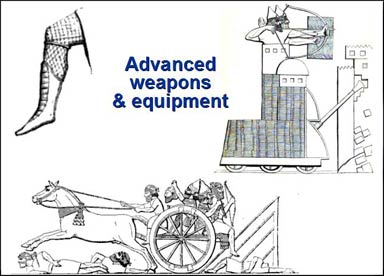 the Assyrians, seeking to expand their empire in all directions. Over generations, the Assyrians had perfected their weapons, war machines, battle horses, fighting men, and tactics to the point that all fell before them. Isaiah speaks of the king of Assyria as the man "who shook the earth and made kingdoms tremble, the man who made the world a desert, who overthrew its cities" (Isaiah 14:16-17).
the Assyrians, seeking to expand their empire in all directions. Over generations, the Assyrians had perfected their weapons, war machines, battle horses, fighting men, and tactics to the point that all fell before them. Isaiah speaks of the king of Assyria as the man "who shook the earth and made kingdoms tremble, the man who made the world a desert, who overthrew its cities" (Isaiah 14:16-17).Two coups and perhaps a third
The Arameans or Syrians, whose capital Damascus was closest to the threat, grew desperate. In a coup their king was murdered by Rezin, who began to organize the
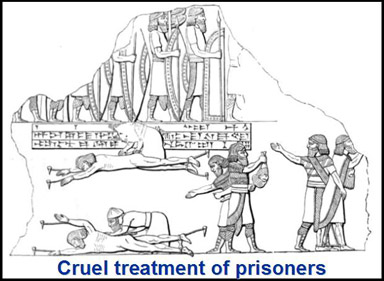 resistance to the Assyrian danger. When Rezin could not get Israel to join him, he orchestrated the assassination of Israel's king Pekahiah, replacing him with Pekah, a man under his complete control. Then the two of them, Rezin and Pekah, approached the king of Judah, Ahaz, proposing an alliance. Behind their proposal was the threat that if he refused, they would stage a third coup, assassinate him and replace him with their own man on the throne in Jerusalem.
resistance to the Assyrian danger. When Rezin could not get Israel to join him, he orchestrated the assassination of Israel's king Pekahiah, replacing him with Pekah, a man under his complete control. Then the two of them, Rezin and Pekah, approached the king of Judah, Ahaz, proposing an alliance. Behind their proposal was the threat that if he refused, they would stage a third coup, assassinate him and replace him with their own man on the throne in Jerusalem.First prophecy: A sign for a frightened king
Ahaz was frightened out of his wits. He was strongly tempted to join the Syro-Ephaemic
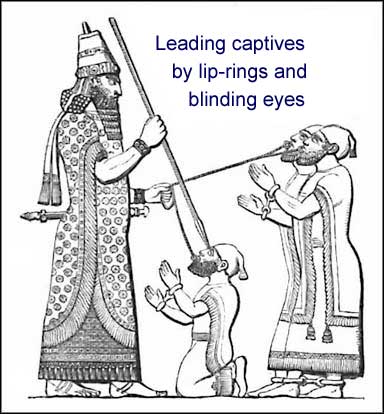 coalition. But the prophet Isaiah warned him it would mean his doom, offering a sign from God that he should hold out. When Ahaz refused to suggest a sign, the prophet gave him one anyway.
coalition. But the prophet Isaiah warned him it would mean his doom, offering a sign from God that he should hold out. When Ahaz refused to suggest a sign, the prophet gave him one anyway.Isaiah said (Isaiah 7:14-17):
The virgin will be with child and will give birth to a son, and will call him Immanuel, He will eat curds and honey when he knows enough to reject the wrong and choose the right. But before the boy knows enough to reject the wrong and choose the right, the land of the two kings you dread will be laid waste. The LORD will bring on you and on your people and on the house of your father a time unlike any since Ephraim broke away from Judah-he will bring the king of Assyria.
In a time desperately wicked, with the darkening clouds
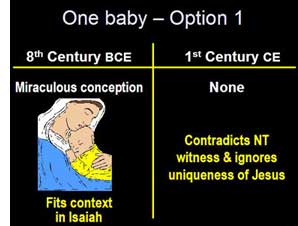 looming on the northeastern horizon, the prophet speaks of a virgin, symbol of purity. Her child would not eat the normal food, for it would all be gone. All the vineyards and farmlands would be covered with briars and thorns. Only a few livestock would survive to graze on what they can find and only honey from the wild would be available for food. Yet his name would be Immanuel: "God is with us."
looming on the northeastern horizon, the prophet speaks of a virgin, symbol of purity. Her child would not eat the normal food, for it would all be gone. All the vineyards and farmlands would be covered with briars and thorns. Only a few livestock would survive to graze on what they can find and only honey from the wild would be available for food. Yet his name would be Immanuel: "God is with us."How do we interpret the virgin prophecy?
Assuming that Isaiah's prophecy had some literal
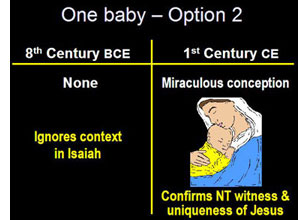 fulfillment, I can conceive of five different options: two in which only one baby was born, and three involving two babies.
fulfillment, I can conceive of five different options: two in which only one baby was born, and three involving two babies.Only one baby was conceived
1. A miraculous conception in Isaiah's time, none in first century. This fits the context of Isaiah but contradicts the New Testament testimony that the prophecy was fulfilled in the conception of Mary, and it ignores the uniqueness of Jesus.
2. No conception in Isaiah's time,
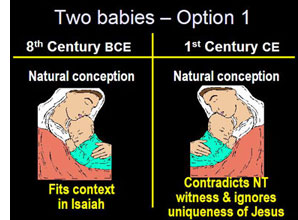 but a miraculous conception in the first century. This confirms the New Testament testimony and the uniqueness of Jesus, but it contradicts the context of Isaiah.
but a miraculous conception in the first century. This confirms the New Testament testimony and the uniqueness of Jesus, but it contradicts the context of Isaiah.Two babies were conceived
1. A natural conception in Isaiah's day and another natural conception in the first century. This fits the context in Isaiah well enough, but it contradicts the New Testament testimony and ignores the uniqueness of Jesus.
2. A miraculous conception in Isaiah's day and another miraculous conception in the first century. This fits the context in Isaiah and agrees with the testimony
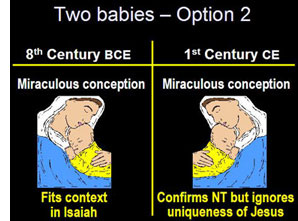 of the birth of Jesus, but it ignores the uniqueness of Jesus.
of the birth of Jesus, but it ignores the uniqueness of Jesus.3. A natural conception in Isaiah's day and a miraculous conception in the first century. This is the only alternative that both takes seriously the context of Isaiah, confirms the New Testament testimony of the conception of Jesus, and affirms the uniqueness of Jesus. It also explains the ambiguity of the Hebrew text, which uses the term almah of the woman conceiving the child. Almah can mean 'virgin,' but it can also refer to a maiden with no specification regarding her virginity. The usual word for virgin in Hebrew is bethulah. The
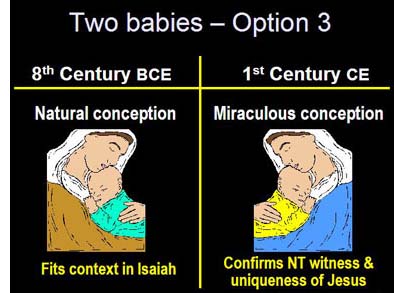 New Testament, however, was written in Greek, which uses the unambiguous term parthenos to refer to the virgin was became Jesus' mother by miraculous intervention of the Holy Spirit.
New Testament, however, was written in Greek, which uses the unambiguous term parthenos to refer to the virgin was became Jesus' mother by miraculous intervention of the Holy Spirit.Second prophecy: A ruler's birthplace
At about the same time, an older prophet, Micah, also delivered his oracle (Micah 5:1-5):
Marshall your troops, O city of troops, for a siege is laid against us. They will strike Israel's ruler on the cheek with a rod. But you, Bethlehem Ephrathah, though you are small among the clans of Judah, out of you will come for me one who will be ruler over Israel, whose origins are from of old, from ancient times. Therefore Israel will be abandoned until the time when she who is in labor gives birth and the rest of his brothers return to join the Israelites. He will stand and shepherd his flock in the strength of the LORD, in the majesty of the name of the LORD his God. And they will live securely, for then his greatness will reach to the ends of the earth. And he will be their peace.
Bribes seldom work
Ahaz wouldn't listen to these reassurances. Rather than relying on the LORD's deliverance, he sent messengers to say to Tiglath-Pileser, "I am your servant and vassal. Come up and save me out of the hand of the king of Aram and the king of Israel, who are attacking me." The record says that "Ahaz took the silver and gold found in the temple of the LORD and in the treasuries of the royal palace and sent it as a gift of the king of Assyria. The king of Assyria complied by attacking Damascus and capturing it. He deported its inhabitants to Kir and put Rezin to death" (2 Kings 16:7-9). This Tiglath-Pileser probably would have done anyway, without the bribe from Ahaz. Plus, as in the case of Menahem, the bribe of Ahaz would only have convinced the Assyrians that Jerusalem was a prize worth having.
Galilee emptied
It must be that during that same campaign, the Assyrians overran "Gilead and Galilee, including all the land of Naphtali, and deported the people to Assyria" (2 Kings 16:29).
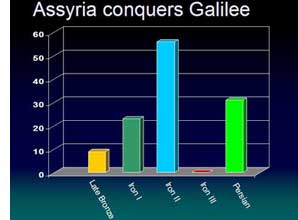 The devastation of Galilee was so complete that archaeologists have found no evidence that it was even occupied for at least two hundred years. In site after site they have discovered an obvious gap in the sherds and occupation levels they have found throughout Galilee-almost none from the seventh and sixth centuries (Iron III). The land lay desolate and virtually empty until well into the Persian period, confirming Micah's prophecy. Right in the place where, a few years earlier, Jonah's prophecy of prosperity had been fulfilled, what few people remained truly "sat in darkness."
The devastation of Galilee was so complete that archaeologists have found no evidence that it was even occupied for at least two hundred years. In site after site they have discovered an obvious gap in the sherds and occupation levels they have found throughout Galilee-almost none from the seventh and sixth centuries (Iron III). The land lay desolate and virtually empty until well into the Persian period, confirming Micah's prophecy. Right in the place where, a few years earlier, Jonah's prophecy of prosperity had been fulfilled, what few people remained truly "sat in darkness."Third prophecy: The four names of the coming ruler
Yet Isaiah predicted (Isaiah 9:1-7):
In a time when the rulers were senseless, Isaiah looked forward to a King whose wisdom was so great that he would be known as "Wonderful Counselor." In a day when the leaders were weak and fearful, the prophet predicted one to be called "Mighty God." In a period when ruler succeeded ruler in swift succession, the seer foretold of a Sovereign who would be the "Father of the Ages." And during fifty years of constant war, terrible atrocities, and unspeakable cruelty, Isaiah foresaw the coming Messiah, who would be "Prince of Peace." In such unfathomably deep darkness, no more brilliant light could shine forth.
In the darkest midnight
Seven hundred years later, the land writhed under an even stronger oppressor. Israel had lost her independence because one of the quarreling rivals to her throne had called in the Roman general Pompey. He came all right, but took the land for Rome and never gave it back.
 Another great darkness settled over the land, until the star of Bethlehem arose in the east. "Glory to God in the highest," sang the angelic host. "And on earth peace to men on whom His favor rests." Once more, in the darkest midnight, a great light shone forth.
Another great darkness settled over the land, until the star of Bethlehem arose in the east. "Glory to God in the highest," sang the angelic host. "And on earth peace to men on whom His favor rests." Once more, in the darkest midnight, a great light shone forth.And to all of us, who stumble through our own times of darkness, the word of the Lord announces, "Immanuel! God is with us!"
- There is no foolishness that the Wonderful Counselor cannot set aside.
- There is no weakness that the God called "Mighty" cannot overcome.
- There is no ongoing trial that the Father of the Ages does not outlast.
- And there is no turmoil in this war-weary world that He who is called the 'Prince of Peace' cannot bring to an end.
"Get up, O sleeper! Rise from the dead, and Christ will shine on you."
Want to go deeper?
The following are recommended to help you look deeper into these things.
The prophecies about the birth of Jesus:
Edward J. Young. The Book of Isaiah (3 vols.) – Excellent commentary by a conservative scholar.
Gresham Machen. The Virgin Birth of Christ
Archaeology of Galilee:
Jonathan L. Reed. Archaeology and the Galileean Jesus: A Re-examination of the Evidence (2000)
The Assyrian Crisis in Israel and Judah:
John Bright. A History of Israel, 4th ed. (2000)
Brevard Childs. Isaiah and the Assyrian Crisis (1983)
The Assyrians as warriors (available online):
Philip Henry Gosse. Assyria: Her Manners and Customers, Arts and Arms: Restored from Her Monuments (1852)